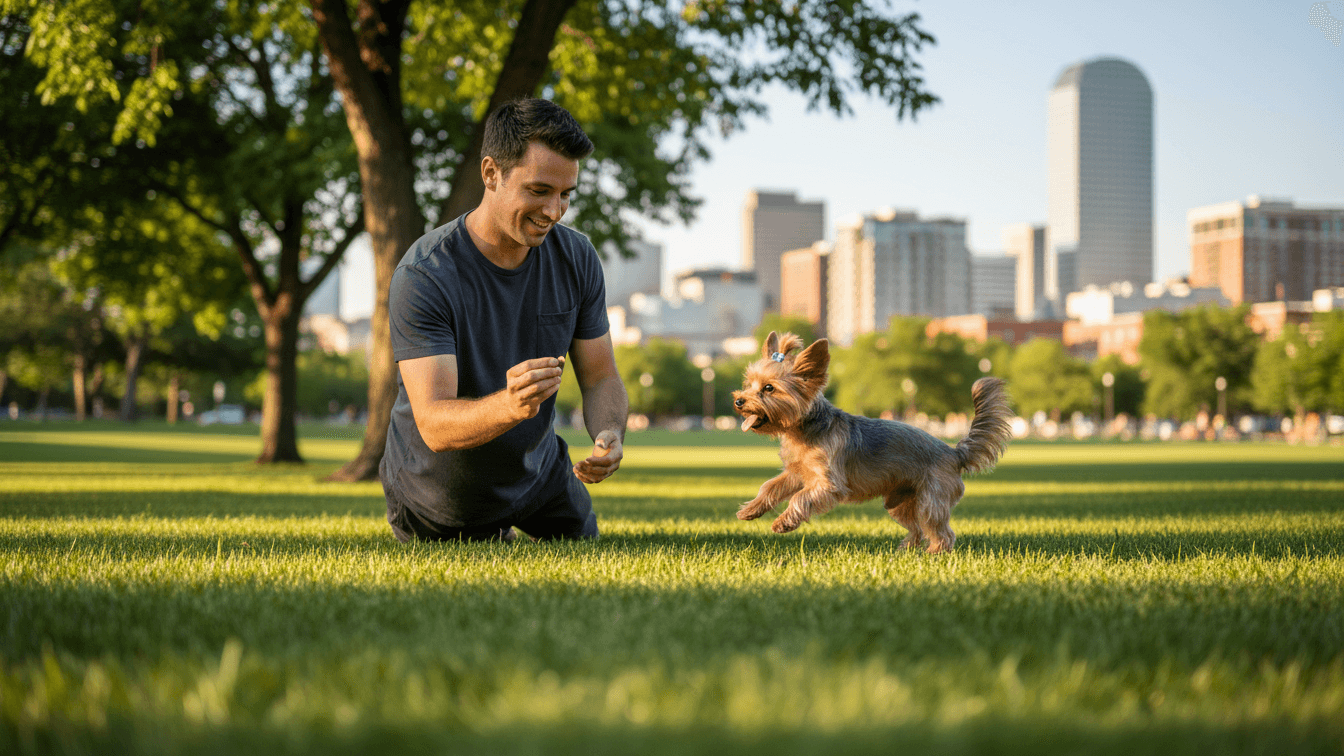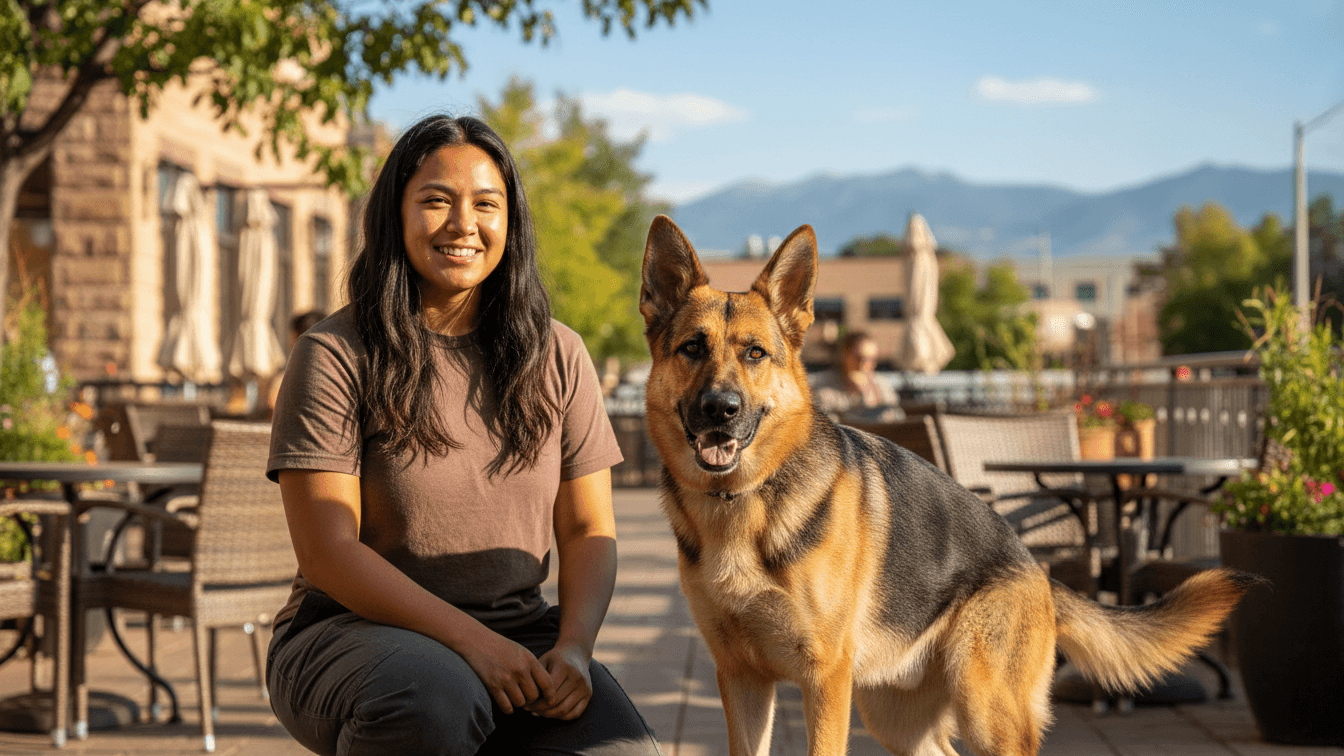Your Complete Guide to Choosing a Dog Trainer in Denver, CO
Living with a dog in Denver means navigating trails in busy parks like Cheesman and Washington, handling your dog at outdoor patios along Tennyson Street, and maybe taking your pup to events in RiNo or the Highlands. Your dog needs to stay calm during all of this, from loose-leash walks on the Cherry Creek Trail to staying polite when runners and cyclists pass by.
Since Denver sits in Denver County, the city enforces its own municipal codes alongside Colorado state law. When you find a trainer who understands these local details, you’ll get better results both at home and out in your community.
How to Choose the Right Trainer
Start by looking for someone who uses positive reinforcement training and can set realistic goals for your Denver lifestyle. This means your dog should learn to walk calmly on crowded urban trails, stay focused near food trucks and street festivals, and handle vet visits without drama.
Credentials give you a quick way to compare trainers’ experience levels. Common dog trainer certifications include KPA-CTP, CPDT-KA, or IAABC-CDBC for behavior problems. If your dog has serious aggression issues, look for someone with CBCC-KA or a science-based program like CTC.
In-home dog training works great for puppy manners, door greetings, and neighborhood leash skills. Group classes make sense once your dog can focus around other dogs, especially before you try busy spots like Berkeley Dog Park or events along South Broadway.
Common Dog Training Methods Explained

Reward-based methods build the trust you want while creating lasting behavior changes. They also help you follow Denver’s strict rules about keeping dogs under control in public.
Basic obedience covers sit, down, stay, place, recall, and leash training so your dog can handle walks, restaurant patios, and park visits without pulling or jumping on people. These skills are essential when you’re walking through crowded neighborhoods like Capitol Hill or Cherry Creek.
Puppy training focuses on socialization, potty training, bite control, crate comfort, and early leash skills. Starting with short, positive sessions prevents bad habits from forming in the first place.
Behavior modification addresses fear, reactivity, resource guarding, or separation anxiety through careful desensitization and counterconditioning. For serious cases, ask if your trainer works with local veterinarians.
Private lessons and in-home training let you customize everything around your daily routines, while day training can speed up results when you’re short on time. Board and train programs may work for specific situations, but make sure the facility uses humane methods and includes thorough handoff sessions.
Dog training classes help your dog practice good manners around other dogs and people. The best classes give dogs plenty of space, screen participants carefully, and teach calm behavior rather than just excitement.
Specialized training like therapy dog training or service dog training requires extra structure, public-access skills, and a very clear step-by-step program. Denver’s urban environment offers plenty of opportunities to practice these advanced skills.
Stay away from trainers who use fear, intimidation, or pain to get results. Humane methods are safer for everyone, easier to maintain long-term, and much better for keeping peace with your neighbors in Denver’s dense residential areas.
Average Cost of Dog Training in Denver, CO (Updated for 2025)
Prices around Denver depend on the trainer’s experience, how long training sessions last, and where the training happens. Here’s what most local pet owners are paying in 2025.
| Service Type | Average Cost (Denver) |
|---|---|
| Puppy classes (4-6 weeks) | $175-$325 total |
| Group obedience classes (4-6 weeks) | $190-$350 total |
| Private lessons (60-90 min) | $125-$225 per session |
| In-home coaching packages (4-6 visits) | $500-$1,100 total |
| Day training (trainer works your dog + handoff) | $500-$1,100 per week |
| Behavior consult for reactivity/anxiety (initial) | $175-$300 |
| Board and train (2-4 weeks) | $2,500-$5,500 total |
You’ll probably pay rates on the higher end for certified dog trainers with advanced credentials and for complex behavior work. Denver’s cost of living affects pricing across all dog training services.
Make sure you understand what’s included, how the professional dog trainer tracks progress, and whether they offer a free consultation before you sign up.
Questions to Ask a Potential Dog Trainer
- What training methods do you use, and how do you keep sessions positive and low-stress?
- What credentials do you have, like KPA-CTP or CPDT-KA? Do you keep up with continuing education such as CPDT-KSA?
- How will you customize the training program for my dog’s specific needs and our Denver lifestyle?
- Do you offer in-home visits, group classes, or day training, and which approach fits my goals best?
- How will we measure my dog’s progress and know when to add more distractions?
- What are the total costs, including any travel fees, and what’s your cancellation policy?
- Do you carry liability insurance, and can you show me proof?
- For behavior problems, will you work with my veterinarian if needed?
- What should I practice between our sessions to help my dog keep improving?
- Have you worked with dogs that need to handle Denver’s altitude, urban environment, and high-traffic areas?
Local Denver Rules and Considerations
Denver enforces strict leash laws and nuisance rules to keep parks and neighborhoods safe for everyone. Understanding these regulations will help your dog become a well-behaved dog in the community.
Leashes are required in all public spaces except inside designated dog parks. Dogs must be on a leash no longer than 8 feet per Denver Municipal Code. Keep a standard 6-foot leash with you for city parks and greenways.
Colorado law requires current rabies vaccination for all dogs. You can get these through county clinics or your regular vet. Dogs over four months old must also be licensed annually with Denver Animal Protection.
Excessive barking can be considered a nuisance under Denver’s noise ordinances, so work with your trainer on alert barking and separation anxiety before neighbors start complaining. Training for dogs with reactivity issues is especially important in Denver’s dense residential neighborhoods.
Colorado doesn’t require special licenses for dog trainers, but if a business boards dogs for payment, the state’s Pet Animal Care Facilities Act (PACFA) oversees kennel licensing through the Colorado Department of Agriculture. Ask about facility inspections if you’re considering board and train options.
Denver Animal Protection provides information about licensing, lost pets, microchips, and other city resources. They also handle animal welfare investigations and stray animals.
Local Denver Resources for Dog Owners
These spots give you great places to practice polite manners, work on recalls, and provide safe enrichment for your dog. Always follow the posted rules and etiquette guidelines.
- Berkeley Dog Park offers separate areas for small and large dogs with shade structures and water. Practice recalls and calm greetings during quieter weekday mornings.
- Barnum Dog Park in West Denver features fenced areas perfect for working on dog obedience training around distractions.
- Railyard Dog Park near Union Station sits right downtown and helps dogs learn to stay calm in urban environments with nearby traffic and pedestrians.
- Cherry Creek Trail welcomes leashed dogs along its entire 40-mile route, offering excellent opportunities to practice loose-leash walking and focus around cyclists and joggers.
- Denver Off-Leash Dog Parks provides a complete list of all city-managed off-leash areas with rules and hours on the official Denver Parks and Recreation website.

FAQs
How much does in-home dog training cost?
Most Denver trainers charge $125-$225 per in-home visit, with discounts available when you buy packages. Behavior problems typically start at the higher end of that range.
Is in-home dog training worth it?
Absolutely, because you’re working on problems exactly where they happen. Your trainer can fix door manners, jumping on guests, counter-surfing, and yard reactivity right at home, then step outside to practice leash skills on your actual neighborhood sidewalks.
Can you pay someone to house train your dog?
Yes, many expert dog trainers offer puppy programs that include potty training, crate routines, and daily schedules. Day training can speed up the process while teaching you how to maintain the progress.
What is the 3-3-3 rule for dog training?
This is a helpful timeline for new or adopted dogs: expect about 3 days for your dog to decompress, 3 weeks to learn your routines, and 3 months to feel completely settled. Good training plans work with this natural adjustment period.
How long will it take to reach my training goals?
Most puppies and friendly adult dogs show solid progress within 4-8 weeks if you practice daily. Fear, reactivity, or aggression typically requires several months of careful behavior modification with gradual increases in difficulty.
What should I bring to group classes?
Pack a flat collar or harness, a 6-foot leash, high-value treats, water, and current vaccination records if your trainer requests them. Leave retractable leashes at home for safety reasons.
What’s the leash law in Denver?
Dogs must be leashed and under control in all public areas with a leash no longer than 8 feet, except inside designated off-leash dog parks. Keep that standard leash handy for city parks, greenways, and sidewalks.
Do I need a dog license in Denver or Denver County?
Yes, all dogs over four months old must be licensed annually with Denver Animal Protection. You’ll need proof of current rabies vaccination to get your license, which you can obtain online or in person.
What shots does my dog need in Denver County or Colorado?
Rabies vaccination is required throughout the state for all dogs over four months old. Your veterinarian may also recommend distemper-parvo, bordetella, and other vaccines based on your dog’s lifestyle and exposure to other animals.
Are dog trainers required to be licensed in Denver or Denver County or Colorado?
No special trainer licenses exist in Colorado. Trainers follow normal business regulations, but if they offer board and train services, their facility may need to be licensed under Colorado’s Pet Animal Care Facilities Act (PACFA) through the state Department of Agriculture.
Where can I practice off-leash recall?
Use fenced dog parks throughout Denver to keep things safe and legal. Berkeley, Barnum, and Railyard dog parks all allow off-leash play within their designated areas. Try visiting during quieter hours when you’re starting out.
Which dog parks allow training around Denver?
All Denver dog parks allow training within their fenced off-leash areas. Berkeley Dog Park, Barnum Dog Park, and Railyard Dog Park are popular choices. Some trainers also use quieter parks during off-peak hours to help your dog build confidence.
What beaches or trails allow dogs for training?
While Denver doesn’t have beaches, many trails welcome leashed dogs. Cherry Creek Trail, High Line Canal Trail, and Clear Creek Trail all offer excellent training opportunities. Most trails within Denver Mountain Parks also allow leashed dogs.
How do I help my dog adjust to Denver’s altitude?
Dogs new to Denver may need a few days to adjust to the thinner air, just like people. Start with shorter walks and gradually build up distance. Work with your trainer to create a training program that accounts for your dog’s fitness level.
What if my dog has separation anxiety in a Denver apartment?
Many Denver residents live in apartments and condos where barking can quickly become a problem. A qualified trainer can help your dog through behavior modification techniques that reduce separation anxiety without disturbing neighbors.
Can I bring my dog to Denver’s outdoor dining areas?
Many Denver restaurants with patios welcome well-behaved dogs. Your dog must remain on leash and under control at all times. This makes basic obedience and calm settling skills especially important for enjoying Denver’s food scene.
What should I do if my dog is reactive on Denver’s busy trails?
Start with quieter trails during off-peak hours and work with a trainer who specializes in reactivity. Practice focus exercises before adding the distraction of cyclists, runners, and other dogs. In-home training sessions can build a strong foundation before tackling busier areas.
The right combination of thoughtful planning, humane methods, and consistent practice around Denver’s parks and neighborhoods will help your dog become a confident, well-behaved companion. Many trainers offer a free evaluation to assess your dog’s needs and recommend the best approach for your situation.
